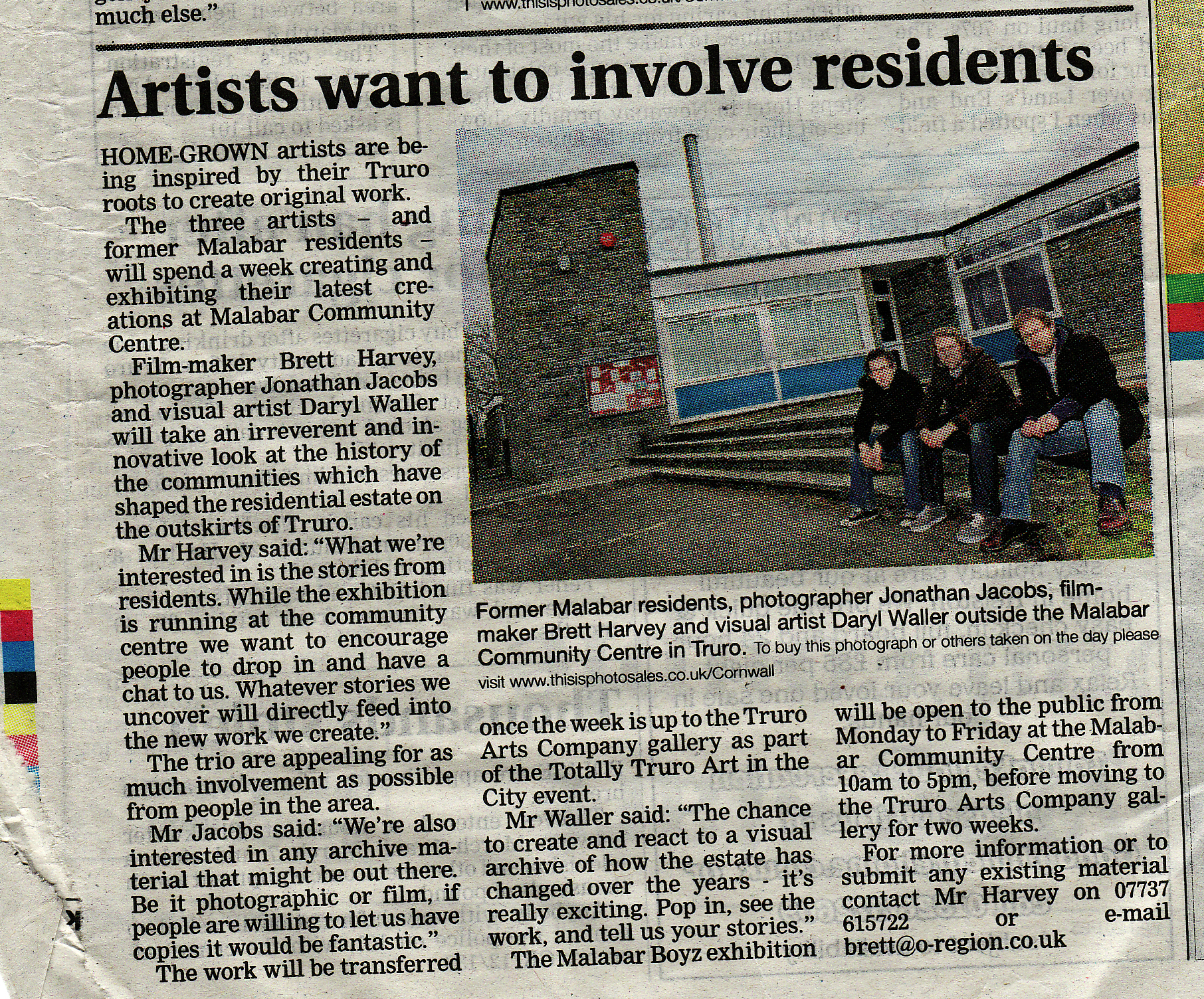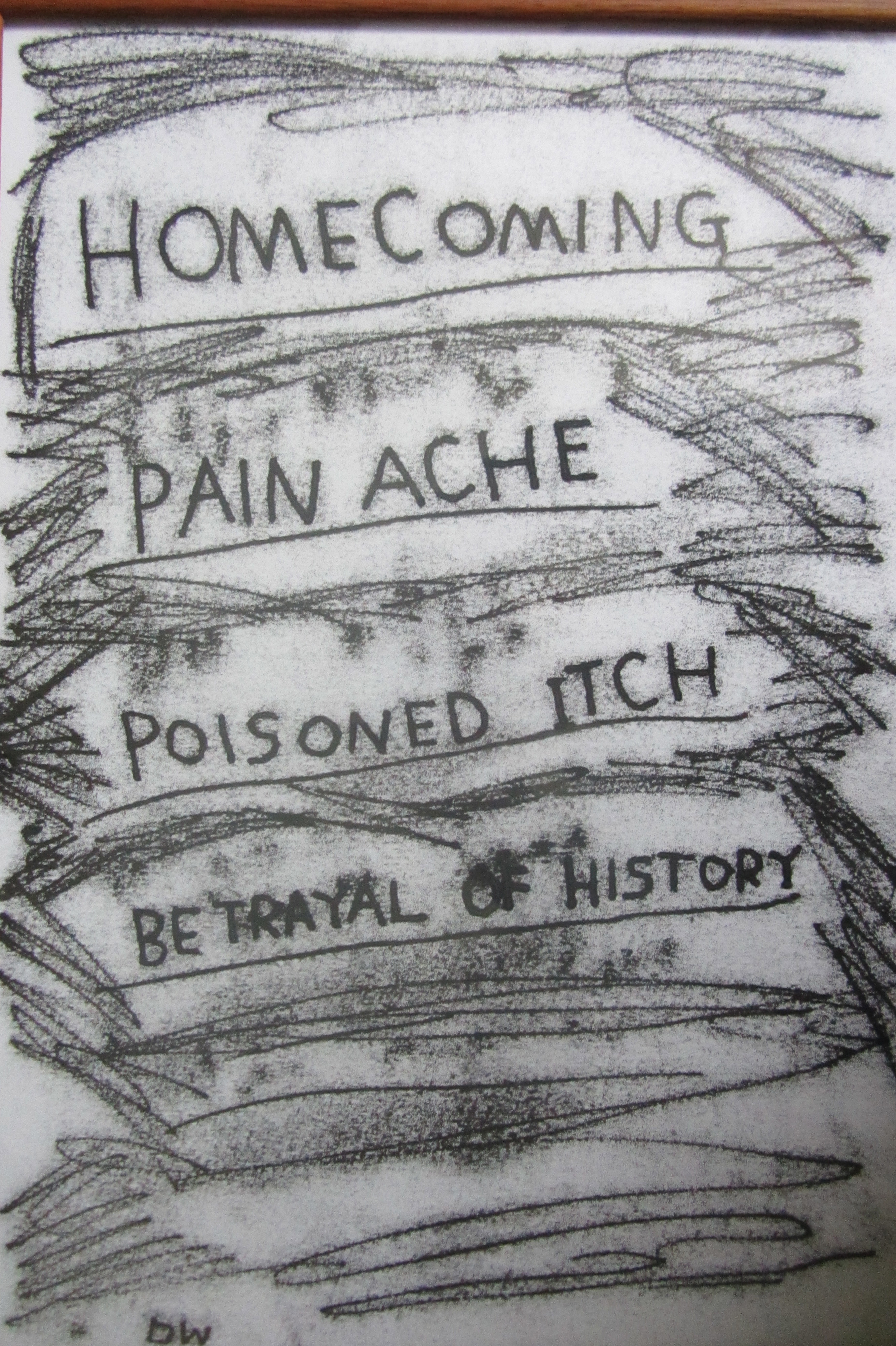Malabar boyz, 2012
Press release:
Using the Malabar Estate as inspiration, three artists (and ex – Malabar residents) will spend a week creating and exhibiting original work in the Malabar Community Centre, before transferring work to the Truro Arts Company gallery as part of the Totally Truro ‘Art in the City’ event.
Using a mixture photography, drawing and film, the three artists (film maker Brett Harvey, photographer Jonathan Jacobs and visual artist Daryl Waller) will take an irreverent and innovative look at the history of the communities which have shaped this aging residential estate on the outskirts of Truro City.
Working closely with the present community and ex-residents, the team hope to uncover the hidden truth behind the myths of Malabar Estate and create a unique tribute to the landscape which shaped their early lives.
“What we’re interested in is the stories from residents” says Brett “while the exhibition is running at the community centre we really want to encourage people to drop in and have a chat to us, whatever stories we uncover will directly feed into the new work we create.
“We’re also interested in any archive material that might be out there” offers Jonathan “Be it photographic or film, if people are willing to let us have copies it would be fantastic”.
“The chance to create and react to a visual archive of how the estate has changed over the years, it’s really exciting.” Adds Daryl “Pop in, see the work, have a cup of tea and tell us your stories”. In addition to the week long exhibition there will also be a free evening of short films hosted at the Malabar Community Centre on Tuesday 27th March. The award winning short films will screen from 7pm and are open to anyone aged 12 and over.
THE MALABAR BOYZ exhibition will be open to the public from MONDAY 26TH to SATURDAY 31ST MARCH at the Malabar Community Centre 10am – 5pm, Monday to Friday before moving to the Truro Arts Company gallery the following week for a two week exhibition. For more information or to submit any existing material please contact Brett Harvey.



---------------------------------------------------------------------------------------------------------------------
![]() Resulting work
Resulting work
These four mono-prints were a direct and quick response to working at the Malabar Community Centre for one week on an exhibition / project called The Malabar Boyz. During this week photographer John Jacobs, film-maker Brett Harvey and myself attempted to uncover the history of the Malabar Estate, nr Truro, by interacting and talking to the people who live there. Some of these people have lived in Malabar since the estate was build sixty years ago, whilst others have only been there for a short time.
The experience of this residency was bittersweet. I found that giving myself up fully to a time and place that no longer exists, no matter how admirable its qualities and how rewarding these hazy thoughts were, constricting and paralysing. The weight of the collective memories rendered me unable to work or think in the present. The nostalgia (1) was crippling and by the end of the week one I felt ill with it and wanted to be back in the present and thinking about the future. Nostalgic thinking was a force that complicated, rather than simplified, the memories were too vast to focus on.
Like all council estates Malabar has had many famous characters over the years, but one person in particular was mentioned by visitors to the community centre time and time again. Young or old, everyone seemed to remember Mildred Pascoe (aka Millie). Millie was an old woman (probably in her 70s by the time I was growing up in the 1980s) who lived at number 88 Cornish Crescent. Her flat was full of rubbish, cats and rotten food. She had a broad Cornish accent, wore a long brown coats, wooly hats and NHS glasses and was always seen carrying plastic shopping bags. She was known for speaking her mind and losing her temper. She loved cats and young children, and would stop and enquire about the wellbeing of other Malabar residents, always remembering children's names. Unfortunately these children where to grow up and taunt her. (I myself remember being caught swearing at her whilst throwing a coke can towards her). When Millie lost her temper, her voice altered into something quite terrifying; she sounded like a preacher from America's deep South delivering a ‘fire and brimstone’ sermon. When really pushed, her deep voice would break into a shrill scream, her head would fly backwards and her arms would jerk upwards.
I wish I could tell you more about Millie's story; but from what I've learned this week it seems tragic and harrowing. During my week at the centre I learned that she was born in a Truro workhouse and was taken in by a retired Major after her mother died young. The Major employed Millie as a housekeeper. When he died it seems she was rehoused by the council in Malabar. Millie said that she was sexually abused by the Major, and she recounted this to many people. I don't know what Millie's specific psychological or medical diagnosis was, although some people suggest that one illness may have been dementia or Alzheimer's. Millie apparently ended up being taken to St Lawrence's hospital, a specialist psychiatric unit in Bodmin, in the 1990s, where she stayed until her death.
Millie found herself placed in a community that was unable to help or fully sympathise with her. The community repeatedly asked the council for her to be removed, but it seems that neither Millie or the people she lived alongside were given adequate support or help. In my opinion the system failed Mildred. Everyone still talks about her and people visiting the centre told me that there was genuine sorrow when she died. I felt the collective guilt surrounding her mythology, perhaps this is my own guilt being projected, but I've made these prints (Mildred #1 and Mildred #2) as an apology nonetheless.
When the exhibition closes one print will be installed into a secret location at Cornish Crescent, Malabar Road, Truro, and the other print will be leaned against her gravestone, should I be able to find it (2)
RIP Mildred Pascoe
Daryl Waller, 31st March 2012
(1). From the Greek words nests and álgos - meaning "homecoming" and "pain ache.
(2) Trying to locate Millie's gravestone is proving difficult - this note made on the 4th August 2012).
![]()
![]()
![]()
![]()
![]()
Milly, Cornish Crescent, Malabar, Truro, Cornwall 1988.
 Resulting work
Resulting workThese four mono-prints were a direct and quick response to working at the Malabar Community Centre for one week on an exhibition / project called The Malabar Boyz. During this week photographer John Jacobs, film-maker Brett Harvey and myself attempted to uncover the history of the Malabar Estate, nr Truro, by interacting and talking to the people who live there. Some of these people have lived in Malabar since the estate was build sixty years ago, whilst others have only been there for a short time.
The experience of this residency was bittersweet. I found that giving myself up fully to a time and place that no longer exists, no matter how admirable its qualities and how rewarding these hazy thoughts were, constricting and paralysing. The weight of the collective memories rendered me unable to work or think in the present. The nostalgia (1) was crippling and by the end of the week one I felt ill with it and wanted to be back in the present and thinking about the future. Nostalgic thinking was a force that complicated, rather than simplified, the memories were too vast to focus on.
Like all council estates Malabar has had many famous characters over the years, but one person in particular was mentioned by visitors to the community centre time and time again. Young or old, everyone seemed to remember Mildred Pascoe (aka Millie). Millie was an old woman (probably in her 70s by the time I was growing up in the 1980s) who lived at number 88 Cornish Crescent. Her flat was full of rubbish, cats and rotten food. She had a broad Cornish accent, wore a long brown coats, wooly hats and NHS glasses and was always seen carrying plastic shopping bags. She was known for speaking her mind and losing her temper. She loved cats and young children, and would stop and enquire about the wellbeing of other Malabar residents, always remembering children's names. Unfortunately these children where to grow up and taunt her. (I myself remember being caught swearing at her whilst throwing a coke can towards her). When Millie lost her temper, her voice altered into something quite terrifying; she sounded like a preacher from America's deep South delivering a ‘fire and brimstone’ sermon. When really pushed, her deep voice would break into a shrill scream, her head would fly backwards and her arms would jerk upwards.
I wish I could tell you more about Millie's story; but from what I've learned this week it seems tragic and harrowing. During my week at the centre I learned that she was born in a Truro workhouse and was taken in by a retired Major after her mother died young. The Major employed Millie as a housekeeper. When he died it seems she was rehoused by the council in Malabar. Millie said that she was sexually abused by the Major, and she recounted this to many people. I don't know what Millie's specific psychological or medical diagnosis was, although some people suggest that one illness may have been dementia or Alzheimer's. Millie apparently ended up being taken to St Lawrence's hospital, a specialist psychiatric unit in Bodmin, in the 1990s, where she stayed until her death.
Millie found herself placed in a community that was unable to help or fully sympathise with her. The community repeatedly asked the council for her to be removed, but it seems that neither Millie or the people she lived alongside were given adequate support or help. In my opinion the system failed Mildred. Everyone still talks about her and people visiting the centre told me that there was genuine sorrow when she died. I felt the collective guilt surrounding her mythology, perhaps this is my own guilt being projected, but I've made these prints (Mildred #1 and Mildred #2) as an apology nonetheless.
When the exhibition closes one print will be installed into a secret location at Cornish Crescent, Malabar Road, Truro, and the other print will be leaned against her gravestone, should I be able to find it (2)
RIP Mildred Pascoe
Daryl Waller, 31st March 2012
(1). From the Greek words nests and álgos - meaning "homecoming" and "pain ache.
(2) Trying to locate Millie's gravestone is proving difficult - this note made on the 4th August 2012).



Milly, Cornish Crescent, Malabar, Truro, Cornwall 1988.